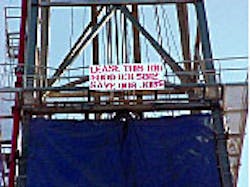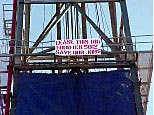MANAGEMENT & ECONOMICS
Victor Schmidt
Houston
Drilling and production operations continue to feel the pinch of constrained oil company cash flows.
Maintaining the only economic engine left
Strong economic activity is essential to work off the surplus crude oil inventory. A strong US (and European) economic engine are helping to stabilize the world economy and providing time for other economies to heal.The 1998 Southeast Asian crisis flooded US financial markets with cash from all parts of the world as investors sought safety. This money flow lifted share prices of stocks and bonds and created a problem for the US Treasury. What should be done with the increased tax receipts, and resulting surplus?
Last year, the agency sopped up some of the excess by retiring maturing debt and not issuing new debt. Now, the agency is considering a wholesale buyback of debt. This could deflate the US economic bubble by circulating more dollars.
The advantage - more circulating dollars will maintain high economic activity and keep interest rates low. The downside - it could create an inflation spiral. Low borrowing costs can only help the petroleum industry.
Worker's angst
Woe continues to spread in the oilpatch, especially in high-cost areas like the North Sea. Hamish Dingwall, Head of the Scottish Enterprise Energy Group, said recently, "Low oil price expectations, combined with recent uncertainty over the tax regime, have delayed many developments and this will have an impact on industry expenditure for at least two years. It will take some years to reverse this trend."In a related event, Statoil announced personnel cutbacks on the Gulfaks B platform. The work force will be reduced by 22 people, leaving 102 to carry out routine operations. "We're making this cutback to improve the platform's earnings capability," said Bjorg Aalstad, Operations Superintendent. Belt tightening will continue as offshore operators strive to contain costs.
Management's angst
Some Russian oil company managements are beginning to feel some of the disciplines available to shareholders under western-style corporate structures. In January, a newly elected, independent Board of Directors of Tomskneft moved to assume control of the company and implement sweeping reforms authorized by shareholders."Tomskneft has long been victimized by the illegal transfer of value from the company," said board member Michael Hunter, "What is unique in this situation is that Russian and Western shareholders have joined with the support of the local government to end this abuse."
Acirota Ltd, a Cyprus-based company, which holds 13% of Tomskneft, called the shareholder's meeting. When similar actions occur across Russia, the climate for foreign investment will improve.
OECD begins to move against bribery payments
Just as countries banned together to fight piracy on the high seas, 34 countries (29 OECD countries plus 5 non-members), have joined forces to fight corrupt practices in international business. A recent article in The Economist points out that corruption has several negative economic effects:- It usually creates inefficiency.
- It is closely connected to economic malpractice.
- It acts as a tax on foreign direct investment.
- It gives corrupt officials an incentive to create red tape and raise the price.
- Payments to government officials outside the home country are considered a crime.
- Tax deductibility of such payments is eliminated.
Production power versus market power
Commodity-based economies worldwide are feeling the press of the global economic slowdown. Overlooked in all the negative news are the problems of the largest oil producer, Saudi Arabia. The country needs as much as US$30-40 billion for large infrastructure projects, Business Week claims. But, the national debt is around US$120 billion and expenses continue to climb by US$1 billion/month.The oil price collapse has demonstrated the limited effectiveness of the kingdom's diversification efforts and its dependence on oil revenue. This is why Crown Prince Abdullah opened discussions with the oil majors in October 1998. In addition to developing a gas infrastructure, Saudi Arabia needs capital and technology to maintain market share in OPEC and to build for the future. Regional competitors, Iran and Iraq, are drawing outside investment commitments to expand production capacity.
The global oil market has neutralized the productive power of the Saudi oil fields, placing the kingdom at risk of an Asian-style economic collapse. The deaths of Jordan's King Hussein and Bahrain's Sheik Isa bin Salman Al Khalifa underscore the political succession problems in the region as well. The global market now dictates policy.
Correcting over-supply with Y2K problems
The current oversupply of crude on the market could be quickly rectified on September 9, 1999. That is the date the first Y2K problems will show up (computer program end-date 9999). Most oil tankers have 8-22 systems onboard that use imbedded computer controls. If any of these systems fail, the vessels will not be safe to operate and will likely be berthed until a fix can be devised. That 1.5 million b/d crude oil surplus could disappear quickly.Y2K benefits
Dr. Scott Shemwell, Director of Energy at MCI Systemhouse, points out the beneficial side of the Y2K hell that companies are struggling to deal with. He states in his newsletter that "...this exercise is creating the most complete list of information infrastructure assets ever assembled."More to the point, this is creating new relationships between management and IT professionals. These benefits can lead to new processes that create competitive advantage for companies. In his words, "This is a once-in-a-millennium opportunity to re-think the organization's approach to managing information infrastructure and capitalizing on new knowledge." The world will be different after December 1999. There will be a great deal to learn from the Y2K experience.
Improving integration
Intense economic pressure is squeezing operations and forcing closer links between technical and business processes. To facilitate this linkage, five leading energy software vendors have launched COM for Energy, a new non-profit industry initiative. It seeks to improve E&P business performance on an enterprise basis through open software standards. Christine Connelly, Vice President Upstream IT for BP Amoco, said, "This initiative complements our company's vision of a networked world that removes barriers all along the value chain."Companies involved include Landmark Graphics, Microsoft, Pricewaterhouse Coopers, SAP, and Schlumberger Geoquest. The open business object specifications will be based on Microsoft's Component Object Model (COM) architecture. David Archer, President and CEO of POSC, said, "COM for Energy is committed to building on and to be compatible with the foundations that the industry has established through POSC and other related initiatives."
For more information check the web,www.com4energy.com.
Copyright 1999 Oil & Gas Journal. All Rights Reserved.

